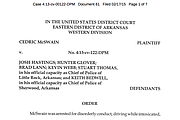A federal judge dismissed a lawsuit that contended four law enforcement officers, including former Little Rock police officer Josh Hastings, used excessive force during an arrest.
Cedric McSwain filed the suit against the lawmen -- Hastings, Sherwood police officer Kevin Webb, and Arkansas State Police Troopers Hunter Glover and Brad Lann -- in March 2013. In the suit, McSwain alleged that the officers beat him while he was trying to get home from birthday celebrations in 2010 and that they unlawfully arrested him. The lawmen, who have denied using excessive force, said they spotted McSwain while on the lookout for a suspect and tried to work with him, but he was unruly.
Former Little Rock Police Chief Stuart Thomas and Sherwood Police Chief Keith Bedwell also were named in the lawsuit. McSwain contended that the department leaders failed to train their officers and had unconstitutional policies, which led to his injuries.
On Tuesday, U.S. District Judge D. Price Marshall Jr. dismissed McSwain's suit. A message left for McSwain on a phone number listed in one of his court documents went unreturned Wednesday.
In the lawsuit, McSwain made claims based on federal and state law. The federal claims were dismissed with prejudice -- meaning McSwain could not refile the suit -- and the state claims were dismissed without prejudice, meaning he could revive those claims in circuit court, according to the judgment and Hastings' attorney, Keith Wren.
McSwain also could file an appeal with the 8th U.S. Circuit Court of Appeals, though Wren said he didn't believe McSwain would take that route.
"I would think probably not -- given that he didn't give a substantive response to the motion [for summary judgment]," Wren said. "I think that an appeal would be an extreme long shot."
McSwain, 43, and his attorney, Morris Thompson, parted ways in October after Thompson said he had difficulties working with the Little Rock man. At the same time, the lawmen had filed motions for summary judgment, asking McSwain for more evidence to move the case forward.
Marshall granted McSwain two extensions to either get another attorney or to respond to the motions on his own.
"McSwain finally responded, disputing no facts and citing no law," Marshall wrote in his order. "He said he was still looking for another lawyer and argued it would be unjust for the Court to grant defendants' motions. In these circumstances, the Court cannot excuse McSwain's failure to respond on the merits."
The suit stems from a March 13, 2010, incident when McSwain was returning home from birthday festivities about 3 a.m. His friend, Joseph Campbell, was taking him home to 2709 S. Monroe St., McSwain has said.
As Campbell reached 29th and Harrison, the two were stopped by a state police trooper, whom McSwain identified in the suit as Glover. Glover said the pair couldn't pass because officers were searching for a man who had fled after a pursuit, the suit said.
Campbell then drove to 27th and Monroe streets and let McSwain out to walk down a hill to his home. But McSwain left his work cellphone in the car and called Campbell to return.
McSwain got his cellphone and again, began the walk to his home when he ran into two officers -- Webb with a police dog in front and Lann behind him -- walking up the hill, the lawsuit states. McSwain said he showed Webb his driver's license to prove he was headed home.
According to the suit, Lann asked to see McSwain's driver's license too, and Hastings, who had just driven up, ran up to them. At that point, McSwain yelled, "You m * * * * * * * * * * * * be tripping," prompting the officers to wrestle him to the ground, McSwain said.
McSwain alleged that Lann and Hastings beat him, while the other officers did nothing to stop the beating. He also said the officers conspired to arrest him even though they didn't have probable cause for an arrest.
The officers have said McSwain was belligerent, screamed out profanities and did not obey the officers' commands. McSwain began resisting arrest as he was led to Hastings' patrol car, they said.
McSwain was charged with driving while intoxicated, disorderly conduct, refusal to submit to an alcohol test, obstructing governmental operations and resisting arrest. A Sherwood district judge found him guilty of resisting arrest and refusal to submit and dropped the DWI charge. McSwain appealed, later pleading no contest to a lesser charge of refusal to submit to arrest.
In his order, Marshall said the law allowed the officers to use force to arrest McSwain, who began struggling to get away. The judge added that the officers needed probable cause on one offense -- not every offense charged -- to make an arrest.
"[McSwain's] conviction in District Court -- and his later no-contest plea -- is a complete defense to McSwain's false-arrest claims," he wrote.
McSwain never provided details to demonstrate the officers conspired to violate his constitutional rights, let alone show the officers violated his constitutional rights, Marshall wrote.
A message left for Amanda LaFever, who represented the Sherwood lawmen, went unreturned Wednesday.
"I think this is what the expected outcome would be," Wren, who represented Hastings in the suit, said of the judgment. "I'm happy and Josh Hastings is happy that there is no longer any pending litigation against him."
Hastings lost his job with the Little Rock Police Department after he was charged with manslaughter in the 2012 fatal shooting of 15-year-old car burglary suspect Bobby Joe Moore III. He was tried twice in the shooting and both cases ended in mistrials.
He had been fighting to regain his position at the department, but later decided to move on, his attorney, Bill James, has said.
Metro on 02/19/2015


